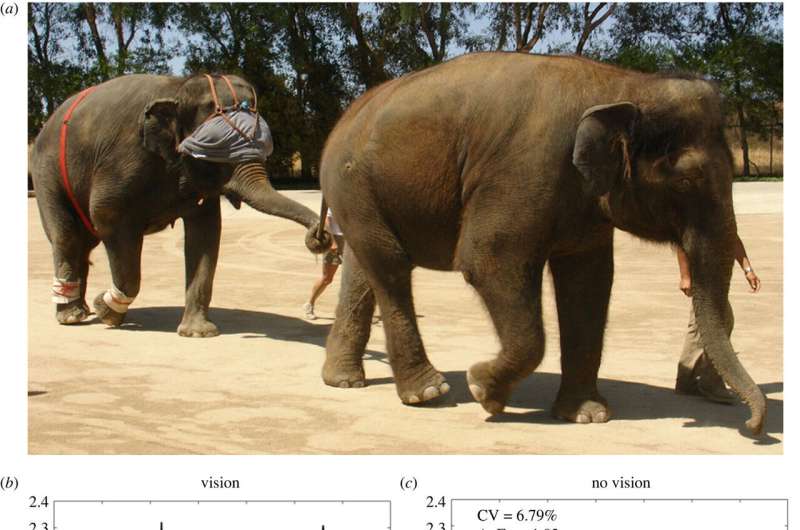September 27, 2023 report
Blindfolded elephant experiments suggest the animals rely on eyesight to maintain balance

Bob Yirka
news contributor

A pair of researchers, one a neuroscientist and physiologist at Boys Town National Research Hospital, the other an evolutionary biomechanics professor at the University of London, reports that elephants rely on their eyesight to maintain their balance. In their study, published in the journal Biology Letters, Max Kurz and John Hutchinson conducted experiments with trained captive elephants.
Prior research has suggested that large animals are more at risk of injury from falls than are smaller animals—and the risk only grows worse the bigger an animal gets. For elephants, a fall could be deadly due to internal organ damage or broken bones. For that reason, maintaining balance is critical for elephants.
Prior research has also shown that different animals have different mechanisms involved in maintaining balance—humans, for example, rely on feedback from their limbs and the vestibular system inside the inner ear. In this new effort, the researchers sought to discover how elephants maintain their balance.
Suspecting that eyesight plays a major role in maintaining balance in Asian elephants, the researchers contacted trainers at Have Trunk Will Travel, a company that trains elephants for use in movie and television roles. Together, the researchers and the training team created huge blindfolds for four Asian elephants. They also strapped GPS trackers to their torsos and accelerometers to their feet. Together, the sensors allowed for monitoring the movements of the elephants and their gait, including the time it took for each footfall to occur.
Next, the handlers asked the elephants to walk single-file in pairs along a path, with the lagging elephant holding the tail of the leading elephant with its trunk. For some walks, the following elephant was blindfolded, for others, it was not.
The researchers then looked for differences in sensor data. They found that timing of footfalls was inconsistent with the elephants that were blindfolded—in some cases, the elephants had difficulty maintaining their stride. The researchers suggest that elephants use their vision as a means of timing their steps, which is how they maintain their balance.
Written for you by our author —this article is the result of careful human work. We rely on readers like you to keep independent science journalism alive. If this reporting matters to you, please consider a (especially monthly). You'll get an ad-free account as a thank-you.
More information: Max J. Kurz et al, Visual feedback influences the consistency of the locomotor pattern in Asian elephants ( Elephas maximus ), Biology Letters (2023).
Journal information: Biology Letters
© 2023 Science X Network




















